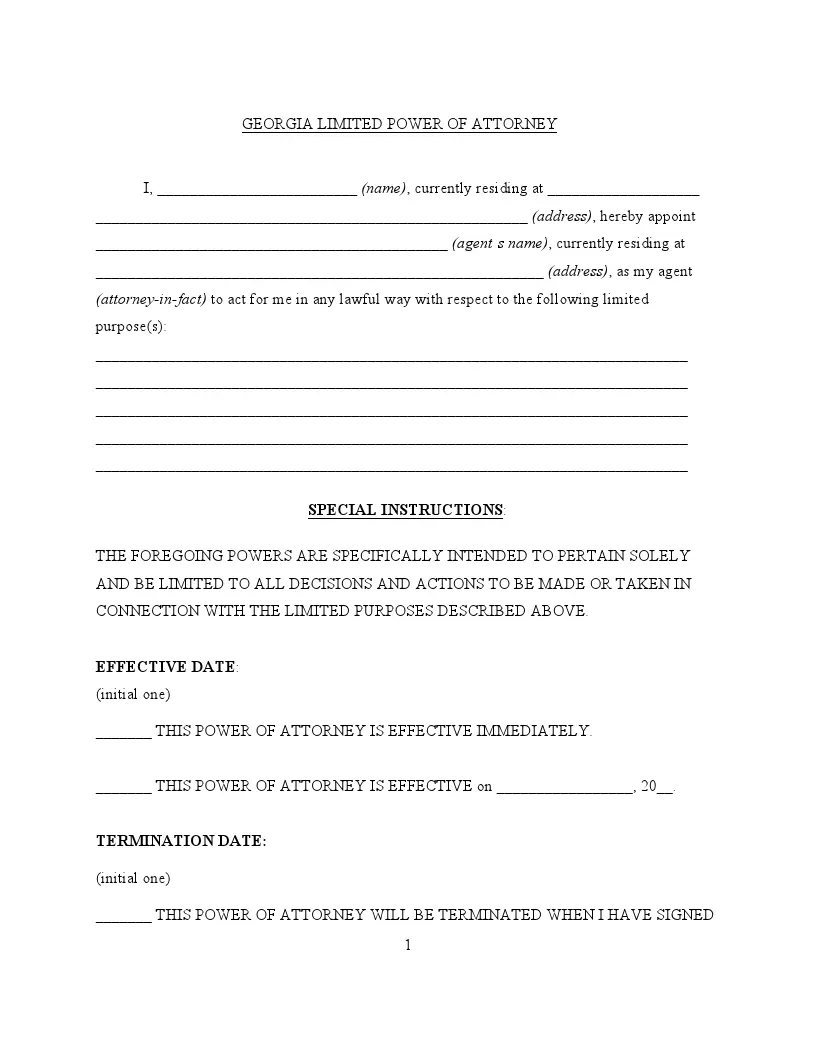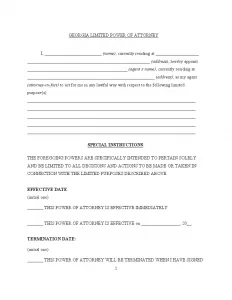Georgia Limited Power of Attorney Form
A Georgia limited power of attorney is a legal document that authorizes one person (the “agent” or “attorney-in-fact”) to act on behalf of another person (the “principal”) in specific matters or situations. The powers granted can be customized to meet specific needs, such as overseeing real estate deals or managing financial portfolios under certain circumstances.
The document distinctly outlines the responsibilities assigned to the agent and usually specifies a particular period during which these powers are valid. Unlike a general power of attorney, which can grant broad authority over many aspects of the principal’s life, a limited power of attorney limits the agent’s authority to a specific area or set of actions.
In Georgia, a limited power of attorney is used when the principal cannot handle certain matters but does not want to relinquish complete control. Check out all Georgia power of attorney forms if you wish to grant your agent more powers.

Build Your Document
Answer a few simple questions to make your document in minutes
Save and Print
Save progress and finish on any device, download and print anytime
Sign and Use
Your valid, lawyer-approved document is ready
In Georgia, the laws and signing requirements for establishing a limited power of attorney are outlined under the Georgia Power of Attorney Act (§§ 10-6B-1 – 10-6B-81). Specifically, the signing requirements are detailed in § 10-6B-5 of the Official Code of Georgia Annotated:
- The principal’s signature (witnessed by one individual).
- Notarization by a licensed notary public.
The authority granted to an agent under a limited power of attorney allows them to act on the principal’s behalf and exercise conditional powers as explicitly stipulated in the agreement. This is provided under § 10-6B-40 of the Act and ensures that the agent’s actions are strictly bound by the terms outlined in the legal document.
Furthermore, the principal retains the unilateral right to revoke the power of attorney at any point, provided they are mentally competent. This revocation must be formalized through a written notice to effectively terminate the powers granted to the agent.
Georgia Limited Power of Attorney Form Details
| Document Name | Georgia Limited Power of Attorney Form |
| Other Name | Georgia Special Power of Attorney |
| Relevant Laws | Official Code of Georgia Annotated, § 10-6B-40 |
| Avg. Time to Fill Out | 8 minutes |
| # of Fillable Fields | 32 |
| Available Formats | Adobe PDF |
Filling Out Georgia Limited POA
Creating a Georgia limited power of attorney involves filling out a form that outlines specific powers that you, as the principal, grant to your chosen agent. This document should be completed carefully to ensure all legal requirements are met and your intentions are communicated.
1. Enter the Principal’s Information
Begin by entering your full name and current residential address in the designated spaces at the top of the form. Make sure the information matches your legal identification to avoid any discrepancies.
2. Appoint Your Agent
In the space provided, write the full name and address of the person you appoint as your attorney-in-fact (agent). This individual will be able to act on your behalf in the areas you specify.
3. Define the Powers Granted
Specify the exact powers you are granting to your agent. Use the “Special Instructions” section to detail the limitations and specific conditions under which these powers can be exercised.
4. Set the Effective Date
Choose when the power of attorney will come into effect. You can decide whether it will be effective immediately or begin later. Initial next to your choice to confirm.
5. Determine the Termination Date
Decide how and when the power of attorney will terminate. Options include upon your written revocation, on a specified date, or in the event of your incapacitation. Again, initial next to your selected option.
6. Designate a Successor Agent
If you wish, appoint a successor agent who will take over should your primary agent be unable to perform their duties. Include the successor’s name and address.
7. Sign and Date the Document
Sign your name and write the date you are completing the form. This formalizes your intent for the power of attorney to be recognized legally.
8. Witness and Notarization
Have the document witnessed by one individual and notarized by a licensed Notary Public. This step is crucial for the legal validation of the form.
